
KFOR
Encyclopedia
The Kosovo Force is a NATO-led international peacekeeping force
responsible for establishing a secure environment in Kosovo
.
KFOR entered Kosovo on 12 June 1999 under a United Nations
mandate, two days after the adoption of UN Security Council Resolution 1244. At the time of UN Security Council Resolution 1244, Kosovo was facing a grave humanitarian crisis, with military forces from the Federal Republic of Yugoslavia (FRY) and the Kosovo Liberation Army
(KLA) in daily engagement. Ethnic tensions were at their highest and the death toll had reached a historic high. Nearly one million people had fled Kosovo as refugees.
As of August 2011, KFOR consists of 5,872 troops.
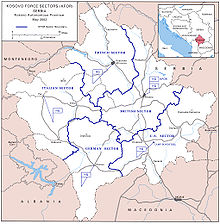 NATO’s initial mandate was:
NATO’s initial mandate was:
Today, KFOR focuses on building a secure environment in which all citizens, irrespective of their ethnic origins, can live in peace and, with international aid, democracy and civil society are gradually gaining strength. KFOR tasks have included:
The Contact Group
countries have said publicly that KFOR will remain in Kosovo to provide the security necessary to support the provisions of a final settlement of Kosovo's status.
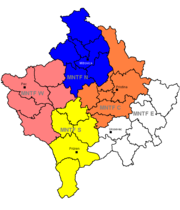
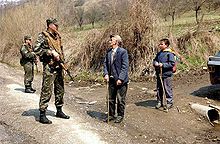
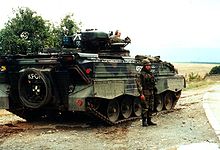
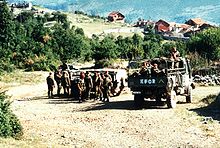 KFOR contingents were originally grouped into 4 regionally based multinational brigades. The brigades were responsible for a specific area of operations, but under a single chain of command under the authority of Commander KFOR. In August 2005, the North Atlantic Council decided to restructure KFOR, replacing the four existing multinational brigades with five task forces, to allow for greater flexibility with, for instance, the removal of restrictions on the cross-boundary movement of units based in different sectors of Kosovo.
KFOR contingents were originally grouped into 4 regionally based multinational brigades. The brigades were responsible for a specific area of operations, but under a single chain of command under the authority of Commander KFOR. In August 2005, the North Atlantic Council decided to restructure KFOR, replacing the four existing multinational brigades with five task forces, to allow for greater flexibility with, for instance, the removal of restrictions on the cross-boundary movement of units based in different sectors of Kosovo.
MNTF-N is deployed in the northern region of Kosovo, headquartered in Novo Selo and is commanded by Colonel Barrera, (French Army).
Contributing nations: Belgium, Denmark, France (Lead nation), Greece, Estonia, Luxembourg, Morocco.
MNTF-E is deployed in the eastern region of Kosovo, headquartered near Uroševac
. The majority of U.S. Soldiers in MNTF-E come from National Guard units, with a different state taking over each rotation of approximately one year.
Camp Bondsteel
serves as the headquarters for Multinational Task Force East (MNTF-E). Camp Monteith
had been previously used by the KFOR, but is now the training camp for the Kosovo Security Force (formally the Kosovo Protection Corps
).
Contributing nations: Greece, Lithuania, Poland, Romania, Ukraine, United States (Lead nation). The official site is http://www.nato.int/KFOR/
MNTF-S is deployed in the southern region of Kosovo, headquartered in Prizren
. This Task Force has been established on May 15, 2006 and is commanded by Brigadier General Stephan Thomas (German Army).
Contributing nations: Austria, Germany (Lead Nation), Switzerland, Turkey, The Netherlands.
MNTF-W is deployed in the region of Metohija, headquartered in Peć
and is commanded by Colonel Carlo Emiliani (Italian Army).
Contributing nations: Italy (lead nation), Slovenia, Hungary, Romania.
MNTF-C was deployed in the region of Drenica, headquartered in Lipljan.
Contributing nations: Czech Republic, Finland, Ireland, Latvia, Slovakia, Sweden.
MSU is deployed in Pristina and is commanded by Colonel Eduardo Russo, (Italian Carabinieri).
The Multinational Specialized Unit (MSU) is a police force with military status, with an overall police capability.
Contributing nations: Italy.
KFOR Tactical Reserve Manoeuvre Battalion (KTM) is a Portuguese Battalion level unit, operating as part of KFOR CJSOR since 2005. Its most relevant characteristics are the absence of caveats, capability to deploy by air or ground Kosovo-wide at reduced NTM, CRC trained and self-sustainable for 72 hours, giving COMKFOR a wide variety of possibilities and flexibility of employment.
KTM is under the direct control of COMKFOR and is commanded by Lieutenant Colonel Nuno Maria Vasconcelos Albergaria Pinheiro Moreira (Portuguese Army)
Starting in March 2011, KFOR will be restructured again, into two multinational battlegroups; one based at Camp Bondsteel
, and one based at Peć
.
The following is a list of the total number of troops which have participated in the KFOR mission. Much of the force has been scaled down since 2008, and so current numbers are reflected here as well:
Contributing NATO Nations:
Contributing non-NATO Nations:
, most women trafficked into Kosovo from abroad are from Moldova
, Romania
, Bulgaria
and Ukraine
.
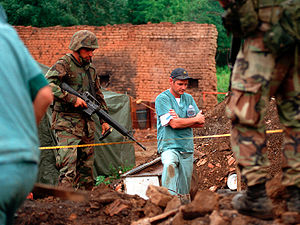 Since the KFOR entered Kosovo in June 1999, 168 NATO soldiers have been killed, mostly in accidents.
Since the KFOR entered Kosovo in June 1999, 168 NATO soldiers have been killed, mostly in accidents.
On October 19, 2004, it was confirmed that 115 NATO soldiers had been killed during the operation. After that 50 more NATO soldiers were confirmed to have died, including 42 Slovak soldiers in a military plane crash in Hungary.
The fatalities by country are: 42 Slovak, 34 Unidentified, 18 American, 13 German, 12 Russian, 8 British, 7 Swedish, 6 Italian, 5 French, 5 Polish, 4 Spanish, 3 Ukrainian, 2 Turkish, 1 Austrian, 1 Danish, 1 Dutch, 1 Greek, 1 Norwegian, 1 Romanian, 1 Slovenian, 1 Swiss, 1 United Arab Emirates and 1 Portuguese.
Eight UNMIK police officers have been killed in Kosovo since 1999, in addition to the KFOR fatalities. The fatalities by country are: 3 American, 1 Indian, 1 Jordanian, 1 Nigerian, 1 Ghanaian and 1 Ukrainian police officer.
the commander of NATO forces in Kosovo said on 20 February, 2008 that he did not plan to step up security in the tense north despite Kosovo Serbs forcing the temporary closure of two boundary crossings between Kosovo and uncontested Serbia
.
In July 2011, following the Kosovo Police's attempts to seize two border outposts and consequent clashes that followed, KFOR troops intervened.
NATO peacekeeping
The North Atlantic Treaty Organization has been involved in active peacekeeping missions since 1994, and coordinates with UN Peacekeeping operations and directives.-The Former Yugoslavia:...
responsible for establishing a secure environment in Kosovo
Kosovo
Kosovo is a region in southeastern Europe. Part of the Ottoman Empire for more than five centuries, later the Autonomous Province of Kosovo and Metohija within Serbia...
.
KFOR entered Kosovo on 12 June 1999 under a United Nations
United Nations
The United Nations is an international organization whose stated aims are facilitating cooperation in international law, international security, economic development, social progress, human rights, and achievement of world peace...
mandate, two days after the adoption of UN Security Council Resolution 1244. At the time of UN Security Council Resolution 1244, Kosovo was facing a grave humanitarian crisis, with military forces from the Federal Republic of Yugoslavia (FRY) and the Kosovo Liberation Army
Kosovo Liberation Army
The Kosovo Liberation Army or KLA was a Kosovar Albanian paramilitary organization which sought the separation of Kosovo from Federal Republic of Yugoslavia in the 1990s....
(KLA) in daily engagement. Ethnic tensions were at their highest and the death toll had reached a historic high. Nearly one million people had fled Kosovo as refugees.
As of August 2011, KFOR consists of 5,872 troops.
Objectives

- to deter renewed hostility and threats against Kosovo by Yugoslav and Serb forces;
- to establish and maintain a secure environment in Kosovo, including public safety and civil order;
- to demilitarise the Kosovo Liberation Army;
- to support the international humanitarian effort;
- to coordinate with and support the international civil presence.
Today, KFOR focuses on building a secure environment in which all citizens, irrespective of their ethnic origins, can live in peace and, with international aid, democracy and civil society are gradually gaining strength. KFOR tasks have included:
- assistance with the return or relocation of displaced persons and refugees;
- reconstruction and demining;
- medical assistance;
- security and public order;
- security of ethnic minorities;
- protection of patrimonial sites;
- border security;
- interdiction of cross-border weapons smuggling;
- implementation of a Kosovo-wide weapons, ammunition and explosives amnesty programme;
- weapons destruction;
- support for the establishment of civilian institutions, law and order, the judicial and penal system, the electoral process and other aspects of the political, economic and social life of the province.
The Contact Group
Contact Group
The Contact Group is the name for an informal grouping of influential countries that have a significant interest in policy developments in the Balkans. The Contact Group is composed of United States, United Kingdom, France, Germany, Italy, and Russia. It was first created in response to the war...
countries have said publicly that KFOR will remain in Kosovo to provide the security necessary to support the provisions of a final settlement of Kosovo's status.
Structure
As of 1 February 2010, the Multinational Task Forces changed the structure and become Multinational Battle Groups.



- Multinational Battle Group North (MNBG-N):
MNTF-N is deployed in the northern region of Kosovo, headquartered in Novo Selo and is commanded by Colonel Barrera, (French Army).
Contributing nations: Belgium, Denmark, France (Lead nation), Greece, Estonia, Luxembourg, Morocco.
- Multinational Battle Group East (MNBG-E):
MNTF-E is deployed in the eastern region of Kosovo, headquartered near Uroševac
Uroševac
Ferizaj or Uroševac is a city and municipality in southern Kosovo, located some south of the capital Pristina.Uroševac is the third most populous city in Kosovo, after Pristina and Prizren.It is the administrative centre of the homonymous district...
. The majority of U.S. Soldiers in MNTF-E come from National Guard units, with a different state taking over each rotation of approximately one year.
Camp Bondsteel
Camp Bondsteel
Camp Bondsteel is the main base of the United States Army under KFOR command in Kosovo. Located near Uroševac in the eastern part of Kosovo, the base serves as the NATO headquarters for KFOR's Multinational Brigade East . The base is named after Vietnam War Medal of Honor recipient United States...
serves as the headquarters for Multinational Task Force East (MNTF-E). Camp Monteith
Camp Monteith
Camp Monteith was a military base near Gnjilane, Kosovo and located about east of Camp Bondsteel. A former Serb artillery outpost and 79 parcels of private land, the area was taken over by U.S. Marines and used as a base of operation during the Kosovo War of 1999. The camp was named after Jimmie...
had been previously used by the KFOR, but is now the training camp for the Kosovo Security Force (formally the Kosovo Protection Corps
Kosovo Protection Corps
The Kosovo Protection Corps was a civilian emergency services organisation in Kosovo active from 1999 to 2009.The KPC was created on September 21, 1999 through the promulgation of UNMIK Regulation 1999/8 and the agreement of a "Statement of Principles" on the KPC's permitted role in Kosovo...
).
Contributing nations: Greece, Lithuania, Poland, Romania, Ukraine, United States (Lead nation). The official site is http://www.nato.int/KFOR/
- Multinational Battle Group South (MNBG-S):
MNTF-S is deployed in the southern region of Kosovo, headquartered in Prizren
Prizren
Prizren is a historical city located in southern Kosovo. It is the administrative center of the eponymous municipality and district.The city has a population of around 131,247 , mostly Albanians...
. This Task Force has been established on May 15, 2006 and is commanded by Brigadier General Stephan Thomas (German Army).
Contributing nations: Austria, Germany (Lead Nation), Switzerland, Turkey, The Netherlands.
- Multinational Battle Group West (MNBG-W):
MNTF-W is deployed in the region of Metohija, headquartered in Peć
Pec
Peć or Pejë is a city and municipality in north-western Kosovo and Metohija - Serbia, and the administrative centre of the homonymous district. Governor of city is Ali Berisha....
and is commanded by Colonel Carlo Emiliani (Italian Army).
Contributing nations: Italy (lead nation), Slovenia, Hungary, Romania.
- Multinational Battle Group Center (MNBG-C) (NO LONGER OPERATIONAL):
MNTF-C was deployed in the region of Drenica, headquartered in Lipljan.
Contributing nations: Czech Republic, Finland, Ireland, Latvia, Slovakia, Sweden.
- Multinational Specialized Unit (MSU):
MSU is deployed in Pristina and is commanded by Colonel Eduardo Russo, (Italian Carabinieri).
The Multinational Specialized Unit (MSU) is a police force with military status, with an overall police capability.
Contributing nations: Italy.
- KFOR Tactical Reserve Manoeuvre Battalion (KTM):
KFOR Tactical Reserve Manoeuvre Battalion (KTM) is a Portuguese Battalion level unit, operating as part of KFOR CJSOR since 2005. Its most relevant characteristics are the absence of caveats, capability to deploy by air or ground Kosovo-wide at reduced NTM, CRC trained and self-sustainable for 72 hours, giving COMKFOR a wide variety of possibilities and flexibility of employment.
KTM is under the direct control of COMKFOR and is commanded by Lieutenant Colonel Nuno Maria Vasconcelos Albergaria Pinheiro Moreira (Portuguese Army)
Starting in March 2011, KFOR will be restructured again, into two multinational battlegroups; one based at Camp Bondsteel
Camp Bondsteel
Camp Bondsteel is the main base of the United States Army under KFOR command in Kosovo. Located near Uroševac in the eastern part of Kosovo, the base serves as the NATO headquarters for KFOR's Multinational Brigade East . The base is named after Vietnam War Medal of Honor recipient United States...
, and one based at Peć
Pec
Peć or Pejë is a city and municipality in north-western Kosovo and Metohija - Serbia, and the administrative centre of the homonymous district. Governor of city is Ali Berisha....
.
Contributing states
At its height, KFOR troops numbered 50,000 and came from 39 different NATO and non-NATO nations. The official KFOR website indicated that in 2008 a total 14,000 soldiers from 34 countries were participating in KFOR.The following is a list of the total number of troops which have participated in the KFOR mission. Much of the force has been scaled down since 2008, and so current numbers are reflected here as well:
Contributing NATO Nations:
| (19,000 troops - now 4) (8,500 - now 1,023) (7,000 - now 796) (7,000 - now 313) (5,000 - now 575) (3,600 - now 7) (1,712 - now 0) (1,470 - now 5) (1,100 - now 0) | (1,000 - now 245) (800 - now 402) (752 – now 426) (308 now 35) (223) (150) (160 – now 320) (97) (62) (30, now 0) | (23) (20, joined 2009) (20, now 0) (10) (4) (4, joined 2009) Estonia Estonian Kosovo Contingent The Estonian Kosovo Contingent or is a joint military force of the Estonian Defence Forces deployed in northern Kosovo, in the area of Kosovska Mitrovica.- History :... - (1) (? - now 0) (0) |
Contributing non-NATO Nations:
| (1500 - now 0) (1,300 - now 135) (4,000? - now 0) (1100 – now 60) (800 - now 0) (561 – now 472) (550-750 - now 0) (395 - now 20) (279 – now 12) (220 – now 220) (200, now 0 - 2000 to present Hospital Argentine Air Force Mobile Field Hospital The Argentine Air Force Mobile Field Hospital is a field hospital operated by the Argentine Air Force. It is one of three health centers of its kind worldwide .- Description :... (ret) + Combat Engineer company) |
(182 - now 0) (158) (70, now 53) (40 - now 0) (34 - now 0) (? now 0) (? - now 0) (? - now 0) |
KFOR Commanders
- Mike JacksonMike JacksonGeneral Sir Michael David "Mike" Jackson, is a retired British Army officer and one of its most high-profile generals since the Second World War. Originally commissioned into the Intelligence Corps in 1963, he transferred to the Parachute Regiment, with whom he served two of his three tours of...
( United Kingdom, 12 June 1999 - 8 October 1999),
United Kingdom, 12 June 1999 - 8 October 1999), - Klaus ReinhardtKlaus ReinhardtKlaus Reinhardt is a former German Army General.He used to be commander of the German Army Forces Command, of the NATO Joint Headquarters Center , and of KFOR in Kosovo.- Military career :In 1960 entered the German Army as a officer candidate with the mountain infantry forces...
( Germany, 8 October 1999 - 18 April 2000),
Germany, 8 October 1999 - 18 April 2000), - Juan Ortuño Such (
 Spain, 18 April 2000 - 16 October 2000),
Spain, 18 April 2000 - 16 October 2000), - Carlo Cabigiosu (
 Italy, 16 October 2000 - 6 April 2001),
Italy, 16 October 2000 - 6 April 2001), - Thorstein Skiaker (
 Norway, 6 April 2001 - 3 October 2001),
Norway, 6 April 2001 - 3 October 2001), - Marcel Valentin (
 Early Modern France, 3 October 2001 - 4 October 2002),
Early Modern France, 3 October 2001 - 4 October 2002), - Fabio Mini (
 Italy, 4 October 2002 - 3 October 2003),
Italy, 4 October 2002 - 3 October 2003), - Holger Kammerhoff (
 Germany, 3 October 2003 - 1 September 2004),
Germany, 3 October 2003 - 1 September 2004), - Yves de Kermabon (
 Early Modern France, 1 September 2004 - 1 September 2005),
Early Modern France, 1 September 2004 - 1 September 2005), - Giuseppe Valotto (
 Italy, 1 September 2005 - 1 September 2006),
Italy, 1 September 2005 - 1 September 2006), - Roland Kather (
 Germany, 1 September 2006 - 31 August 2007),
Germany, 1 September 2006 - 31 August 2007), - Xavier Bout de MarnhacXavier Bout de MarnhacLieutenant General Xavier Bout de Marnhac is a French military commander and former head of the Kosovo Force .-Source:* -External links:* from French Government website...
( Early Modern France, 31 August 2007 - 29 August 2008),
Early Modern France, 31 August 2007 - 29 August 2008), - Giuseppe Emilio Gay (
 Italy, 29 August 2008 - 8 September 2009),
Italy, 29 August 2008 - 8 September 2009), - Marcus Bentler (
 Germany, 8 September 2009 - 31 August 2010),
Germany, 8 September 2009 - 31 August 2010), - Erhard BühlerErhard BühlerGeneral Erhard Bühler was the commander of KFOR, since September 2010 till September 2011. He leads approximately 5000 troops, although the number is declining as the security situation in Kosovo improves....
( Germany, 1 September 2010 - 9 September 2011),
Germany, 1 September 2010 - 9 September 2011), - Erhard Drews(
 Germany, 9 September 2011 - Present)
Germany, 9 September 2011 - Present)
Kosovo, peacekeeping and human trafficking
Since the establishment of the United Nations Mission in Kosovo (UNMIK) in 1999, according to some international organizations Kosovo became a major destination country for women and young girls trafficked into forced prostitution, in part as a result of the presence of peacekeeping forces. According to Amnesty InternationalAmnesty International
Amnesty International is an international non-governmental organisation whose stated mission is "to conduct research and generate action to prevent and end grave abuses of human rights, and to demand justice for those whose rights have been violated."Following a publication of Peter Benenson's...
, most women trafficked into Kosovo from abroad are from Moldova
Moldova
Moldova , officially the Republic of Moldova is a landlocked state in Eastern Europe, located between Romania to the West and Ukraine to the North, East and South. It declared itself an independent state with the same boundaries as the preceding Moldavian Soviet Socialist Republic in 1991, as part...
, Romania
Romania
Romania is a country located at the crossroads of Central and Southeastern Europe, on the Lower Danube, within and outside the Carpathian arch, bordering on the Black Sea...
, Bulgaria
Bulgaria
Bulgaria , officially the Republic of Bulgaria , is a parliamentary democracy within a unitary constitutional republic in Southeast Europe. The country borders Romania to the north, Serbia and Macedonia to the west, Greece and Turkey to the south, as well as the Black Sea to the east...
and Ukraine
Ukraine
Ukraine is a country in Eastern Europe. It has an area of 603,628 km², making it the second largest contiguous country on the European continent, after Russia...
.
KFOR fatalities

On October 19, 2004, it was confirmed that 115 NATO soldiers had been killed during the operation. After that 50 more NATO soldiers were confirmed to have died, including 42 Slovak soldiers in a military plane crash in Hungary.
The fatalities by country are: 42 Slovak, 34 Unidentified, 18 American, 13 German, 12 Russian, 8 British, 7 Swedish, 6 Italian, 5 French, 5 Polish, 4 Spanish, 3 Ukrainian, 2 Turkish, 1 Austrian, 1 Danish, 1 Dutch, 1 Greek, 1 Norwegian, 1 Romanian, 1 Slovenian, 1 Swiss, 1 United Arab Emirates and 1 Portuguese.
Eight UNMIK police officers have been killed in Kosovo since 1999, in addition to the KFOR fatalities. The fatalities by country are: 3 American, 1 Indian, 1 Jordanian, 1 Nigerian, 1 Ghanaian and 1 Ukrainian police officer.
Events
After the 2008 Kosovo declaration of independence2008 Kosovo declaration of independence
The 2008 Kosovo declaration of independence was adopted on 17 February 2008 by individual members of the Assembly of Kosovo acting in personal capacity and not binding to the Assembly itself...
the commander of NATO forces in Kosovo said on 20 February, 2008 that he did not plan to step up security in the tense north despite Kosovo Serbs forcing the temporary closure of two boundary crossings between Kosovo and uncontested Serbia
Serbia
Serbia , officially the Republic of Serbia , is a landlocked country located at the crossroads of Central and Southeast Europe, covering the southern part of the Carpathian basin and the central part of the Balkans...
.
In July 2011, following the Kosovo Police's attempts to seize two border outposts and consequent clashes that followed, KFOR troops intervened.
See also
- European Union Force (EUFOR)
- IFORIFORThe Implementation Force was a NATO-led multinational peacekeeping force in Bosnia and Herzegovina under a one-year mandate from 20 December 1995 to 20 December 1996 under the codename Operation Joint Endeavour. Its task was to implement the military Annexes of The General Framework Agreement for...
- Kosovo Police ServiceKosovo Police ServiceKosovo Police is the police law enforcement agency of the Republic of Kosovo.It was created in 1999 in the aftermath of the Kosovo War and subsequent withdrawal of the Yugoslav armed forces from Kosovo....
- Kosovo Protection CorpsKosovo Protection CorpsThe Kosovo Protection Corps was a civilian emergency services organisation in Kosovo active from 1999 to 2009.The KPC was created on September 21, 1999 through the promulgation of UNMIK Regulation 1999/8 and the agreement of a "Statement of Principles" on the KPC's permitted role in Kosovo...
- Kosovo status process
- Kosovo Security ForceKosovo Security ForceThe Kosovo Security Force is an emergency response force charged with conducting operations in Kosovo and abroad in the areas of Search and Rescue, Explosive Ordnance Disposal, Firefighting, and Hazardous Material Disposal. It is widely assumed that the KSF will take on an additional defense...
- NATO
- SFORSFORThe Stabilisation Force was a NATO-led multinational peacekeeping force in Bosnia and Herzegovina which was tasked with upholding the Dayton Agreement. It replaced the previous force IFOR...
- United Nations Protection ForceUnited Nations Protection ForceThe United Nations Protection Force ', was the first United Nations peacekeeping force in Croatia and in Bosnia and Herzegovina during the Yugoslav wars. It existed between the beginning of UN involvement in February 1992, and its restructuring into other forces in March 1995...
(UNPROFOR)
External links
- KFOR Placemat
- KFOR official site (NATO)
- K-For: The task ahead (from BBC NewsBBCThe British Broadcasting Corporation is a British public service broadcaster. Its headquarters is at Broadcasting House in the City of Westminster, London. It is the largest broadcaster in the world, with about 23,000 staff...
, June 13, 1999) - First deaths in K-For operation (from BBC NewsBBCThe British Broadcasting Corporation is a British public service broadcaster. Its headquarters is at Broadcasting House in the City of Westminster, London. It is the largest broadcaster in the world, with about 23,000 staff...
, June 14, 1999) - Memorial honors soldiers' sacrifices June 2002: 68 soldiers have died since KFOR entered Kosovo.
- Nato force 'feeds Kosovo sex trade' (from The GuardianThe GuardianThe Guardian, formerly known as The Manchester Guardian , is a British national daily newspaper in the Berliner format...
, May 7, 2004) - Radio KFOR

